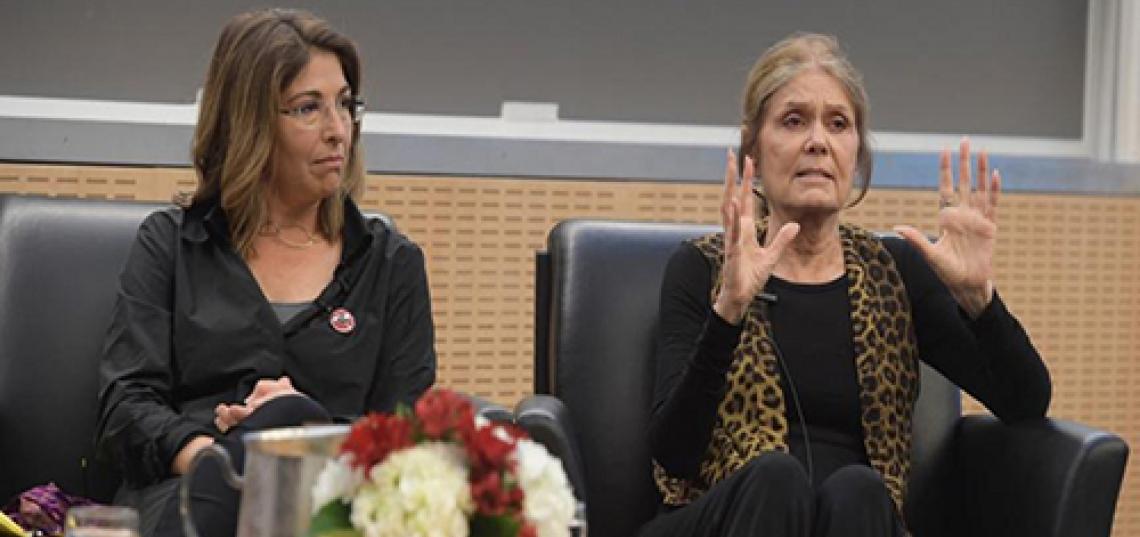
By John Cramer, Rutgers University Office of Communications
Rutgers has launched a search for the next Gloria Steinem Endowed Chair in Media, Culture, and Feminist Studies to follow Naomi Klein, who spent the past three years leading undergraduate seminars and public events that examined the human condition as the first to hold the position.
Klein, an acclaimed writer, public intellectual and social activist, recently concluded her time at Rutgers University-New Brunswick in the first academic chair designed to celebrate the vision of Gloria Steinem, the journalist, social activist and feminist movement leader.
“Serving as the inaugural Gloria Steinem Chair has been both a deep honor and a thrilling adventure,” said Klein, who recently joined the University of British Columbia as a professor of climate justice. “No warmer welcome could have been possible than the one I received from the Rutgers community — both faculty and students — and from the crew of feminist rabble rousers who brought this chair into being. Most thrilling were the events that brought frontline social movement leaders to campus to be in dialogue with leading Rutgers scholars and with our dynamic student body. I am particularly proud of the work we did theorizing and centering women’s care labor as part of a justice-based response to the climate crisis.”
Klein’s tenure at Rutgers coincided with an important time in the United States as social, racial, economic and ecological justice movements and a divisive presidential campaign swept the country.
“Through her teaching, writing and leadership, Naomi Klein challenged our students to connect the dots between feminism and the movements for climate justice, racial reckoning and a new economic paradigm,” said Francine Conway, chancellor-provost of Rutgers-New Brunswick.
“We are extremely grateful to Naomi Klein for her contributions as the first Gloria Steinem Chair,” said Jonathan Potter, dean of the School of Communication and Information at Rutgers-New Brunswick. “She connected scholarship and activism to raise provocative questions and compose innovative solutions. She was generous in sharing her energy and her connections to leaders around the world, and combined resolute political critique with warmth, compassion and a vision for the future.”
“In every class that Naomi taught, every lecture, symposium, workshop and panel discussion she organized, she expanded the ways the Rutgers community can conceptualize solutions to critical global challenges. From exploring the impact of surveillance capitalism to emphasizing the inextricable dependence between climate change and the care economy, Naomi Klein has permanently transformed our imaginative scope,” said Rebecca Mark, director of the Institute for Women’s Leadership.
During her tenure at Rutgers, Klein taught five undergraduate seminars drawing on her decades of research and activism. In her classrooms, students examined the ideas and implications of people as brands, and studied the ways contemporary social movements are shaped by the twin forces of digital technology and marketing logics.
Through 23 public events, Klein brought to campus diverse leading activists and scholars to explore topics such as climate change, big tech, disaster capitalism, indigenous knowledge, the care economy and post-Hurricane Maria in Puerto Rico.
The Gloria Steinem Chair is a collaboration among Rutgers’ School of Communication and Information, Institute for Women’s Leadership and Department of Women’s, Gender, and Sexuality Studies in the School of Arts and Sciences.
The search for the next Gloria Steinem Chair will be conducted during the academic year, with an expected start date of fall 2022. The chair was created with financial support from the Ford Foundation; the John and James L. Knight Foundation; the Diller-von Furstenberg Family Foundation; the John Mack Carter Fund; the Like a River Fund of the California Community Foundation; and more than 400 individual donors.
This article and image were originally published in Rutgers Today on September 13, 2021.
Photo: Nick Romanenko/Rutgers University
